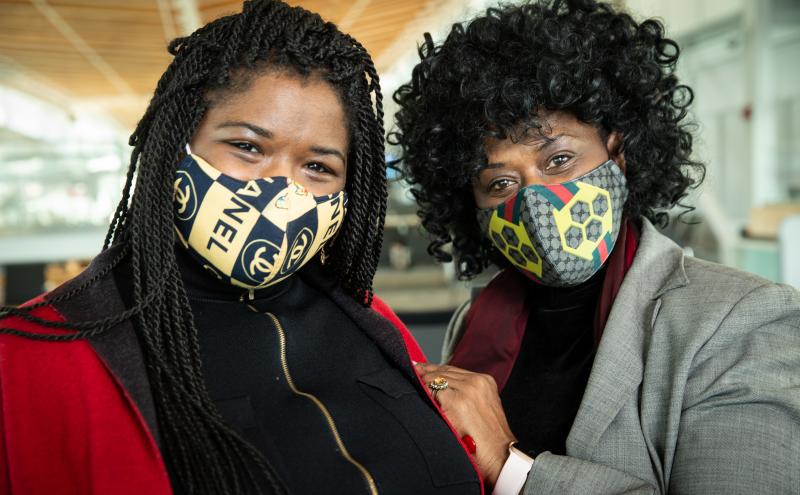
The Port recently received a question from a community member asking, “Why is equity important for a port authority?” Thank you for this thoughtful question and the chance to communicate about our commitment to racial equity.
During the last 18 months, the Port of Seattle has made the important and intentional decision to prioritize racial equity in our practices, policies, services, and culture. In 2019, we became the first port authority in the nation to establish an Office of Equity, Diversity, and Inclusion, which is leading our efforts to become an equitable, anti-racist organization. There is much work ahead to truly realize this goal, but we are committed to imbedding equity, diversity, and inclusion into the fabric of the organization.
Because people’s appetite for content differs, we offer you both a short summary and a longer, more-depth coverage of the Port’s equity work.
- Read the summary version
- Read the in-depth version below
To begin, bias and oppression are embedded in our society, systems, and our organization. By failing to acknowledge systemic inequities, we play a role in perpetuating them. We believe we can and must do better. It is because of the history, policies, and culture — of both the Port and our nation — that racial equity is vital to the success of our organization.
Historical context
Throughout the history of our nation, the government has played a central role in creating and perpetuating racial inequities and patterns of racial disparities. This is foundational to our country, from the mass exploitation, genocide, and seizure of land from Native peoples to the kidnapping and enslavement of Africans. More recently, government policies and practices have and continue to create racial disparities in many aspects of our life, like education, housing, employment, and the justice system. There are many policies that create and perpetuate racial inequities without intending to do so. “Race-neutral” policies and practices, which do not account for existing inequities and the unique needs of different communities, continue to uphold a system where Black, Indigenous, and people of color (BIPOC) experience disproportionately negative outcomes in comparison to white people.
In many ways, governments uphold racial inequities through the distribution and control of resources and decision making. As a special purpose government, the Port of Seattle has the responsibility to expand economic development and quality of life for all through the distribution of resources and opportunities. We recognize that without greater emphasis on undoing racial inequity, our organization will always face an uphill challenge to achieve this public service mission for all members of our community, because we will continue — although unintentionally — to leave historically marginalized communities behind.
As a result, the Port must center racial equity so that we make intentional, informed, and important decisions about how we distribute resources and provide opportunities for economic development, with overt attention to the inclusion of Black, Indigenous, and communities of color. Additionally, we are improving how we involve communities in decision-making processes so that our impact as an economic driver of our region can be collaborative, accountable, and transparent to the needs of the communities in our region.
Policies and practices
Related to the historical context described above, we — as the Port and as a nation — will ultimately create racial equity by transforming our policies, practices, and institutions. Yes, racism affects all of us on an individual basis; bias, discrimination, and fear impact how all of us relate to people of different races. It is everyone’s responsibility to learn to recognize these biases so that we can build relationships with people who are different than us. However, that alone will not create meaningful, lasting, and true racial equity. We must also focus on the role of institutions. Institutional policies and practices continue to create disparities in outcomes based on race. In other words, it is because of policies and systems that race is an indicator of a person’s opportunities and successes. Race-neutral policies, as described above, are challenging, because while they may be well intentioned, their impact is harmful.
Example:
Many government jobs — and the Port is no exception — place a greater importance on education rather than relevant professional experience, even if the educational requirement is not essential to the functions of the job. Since white people graduate from high school, college, and advanced programs at disproportionately higher rates than BIPOC, this creates a pattern of racial disparity. Far too many qualified people of color are ineligible for government jobs because they do not meet the education requirement, even though they have plenty of relevant work experience to perform the functions of the job. Removing unnecessary education requirements allows the most qualified people — of all races — to be eligible to apply for jobs. This is an instance of unintentionally racist policy that benefits white people at the expense of people of color, and if changed, it would benefit all people while simultaneously undoing a barrier that systematically disadvantages people of color.
To change policies and practices, it is critical to see and name race, so that we can see and name patterns of racial disparities. If we do not properly identify a problem, we will never be able to fix it. Through a racial equity framework, the Port is improving and transforming its policies and practices for the benefit of the residents of the region and Port employees. We are working to create a Port where race is not an indicator of a person’s success and access to resources and opportunities.
Culture
There is no biological basis for race — it is a fabricated social construct created to build and maintain power and resources for certain people at the expense of others. Regardless, its impacts are very real. While we are working towards a future where race does not impact a person’s opportunities and success, that is not our current reality. For the life of our country, race has been used as a wedge, pitting us against one another so that those in power remain in power. Race is imbedded in every aspect of our lives — our jobs, entertainment, economic wellbeing, etc.— and everyone has a race. It is a part of our culture.
One of the ways that race functions is that the dominant race (i.e. white people) often does not see themselves as having a race. In other words, whiteness becomes the standard, the normal, and the aspirational. This is reinforced in small, large, conscious, and unconscious ways.
A few great examples of things you may not have thought about:
- Think about adhesive bandages. If you’re white, have you ever wondered why they are very close to the color of your skin?
- Consider media headlines. How often does the media report a person’s race if they are white?
- Study how we refer to CEOs, members of Congress, and other institutional leaders. When a person of color holds one of those positions, isn’t the first part of the story always about their race and them being the first or only person of color to hold that position, rather than about their experience and qualifications?
Racism continually reinforces — even if it is not always visible — that white is good, and not-white is bad. This creates a mainstream culture where people of color are excluded, left behind, and made invisible. No one who is currently alive is responsible for the history, policies, and systems that created this culture, but we all inherited it. And we all have an obligation to fix it.
Our vision of the Port
At the Port of Seattle, we center racial equity because we want to create a culture of belonging. We aspire to create a workplace and an organization where all people — employees and community members — feel included, respected, and welcome. We value diversity as a source of strength and innovation that should be celebrated.
For far too long, many in our region, including the Port of Seattle, have benefitted from white-dominant culture and comfortably operated in an unjust, racist society. We recognize the negative impact this lack of equity has had on our ability to create a region with shared prosperity.
Our vision is to develop a Port that mirrors — throughout its breadth of operations and services and within its leadership structure — the diversity of our community, instills principles of equity in its culture, and ensures a fair and intentional distribution of opportunities with the goal of expanding economic development and quality of life for all.








